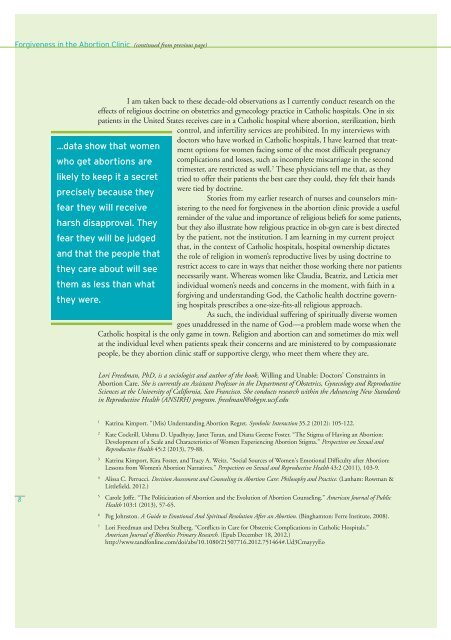atrium-issue-12-BadGirls
atrium-issue-12-BadGirls
atrium-issue-12-BadGirls
Create successful ePaper yourself
Turn your PDF publications into a flip-book with our unique Google optimized e-Paper software.
Forgiveness in the Abortion Clinic<br />
(continued from previous page)<br />
I am taken back to these decade-old observations as I currently conduct research on the<br />
effects of religious doctrine on obstetrics and gynecology practice in Catholic hospitals. One in six<br />
patients in the United States receives care in a Catholic hospital where abortion, sterilization, birth<br />
control, and infertility services are prohibited. In my interviews with<br />
doctors who have worked in Catholic hospitals, I have learned that treatment<br />
options for women facing some of the most difficult pregnancy<br />
...data show that women<br />
who get abortions are complications and losses, such as incomplete miscarriage in the second<br />
trimester, are restricted as well. 7 These physicians tell me that, as they<br />
likely to keep it a secret tried to offer their patients the best care they could, they felt their hands<br />
were tied by doctrine.<br />
precisely because they<br />
Stories from my earlier research of nurses and counselors ministering<br />
to the need for forgiveness in the abortion clinic provide a useful<br />
fear they will receive<br />
reminder of the value and importance of religious beliefs for some patients,<br />
harsh disapproval. They but they also illustrate how religious practice in ob-gyn care is best directed<br />
fear they will be judged by the patient, not the institution. I am learning in my current project<br />
that, in the context of Catholic hospitals, hospital ownership dictates<br />
and that the people that the role of religion in women’s reproductive lives by using doctrine to<br />
they care about will see restrict access to care in ways that neither those working there nor patients<br />
necessarily want. Whereas women like Claudia, Beatriz, and Leticia met<br />
them as less than what individual women’s needs and concerns in the moment, with faith in a<br />
forgiving and understanding God, the Catholic health doctrine governing<br />
hospitals prescribes a one-size-fits-all religious approach.<br />
they were.<br />
As such, the individual suffering of spiritually diverse women<br />
goes unaddressed in the name of God—a problem made worse when the<br />
Catholic hospital is the only game in town. Religion and abortion can and sometimes do mix well<br />
at the individual level when patients speak their concerns and are ministered to by compassionate<br />
people, be they abortion clinic staff or supportive clergy, who meet them where they are.<br />
Lori Freedman, PhD, is a sociologist and author of the book, Willing and Unable: Doctors’ Constraints in<br />
Abortion Care. She is currently an Assistant Professor in the Department of Obstetrics, Gynecology and Reproductive<br />
Sciences at the University of California, San Francisco. She conducts research within the Advancing New Standards<br />
in Reproductive Health (ANSIRH) program. freedmanl@obgyn.ucsf.edu<br />
1<br />
Katrina Kimport. “(Mis) Understanding Abortion Regret. Symbolic Interaction 35.2 (20<strong>12</strong>): 105-<strong>12</strong>2.<br />
8<br />
2<br />
Kate Cockrill, Ushma D. Upadhyay, Janet Turan, and Diana Greene Foster. “The Stigma of Having an Abortion:<br />
Development of a Scale and Characteristics of Women Experiencing Abortion Stigma.” Perspectives on Sexual and<br />
Reproductive Health 45:2 (2013), 79-88.<br />
3<br />
Katrina Kimport, Kira Foster, and Tracy A. Weitz. “Social Sources of Women's Emotional Difficulty after Abortion:<br />
Lessons from Women’s Abortion Narratives.” Perspectives on Sexual and Reproductive Health 43:2 (2011), 103-9.<br />
4<br />
Alissa C. Perrucci. Decision Assessment and Counseling in Abortion Care: Philosophy and Practice. (Lanham: Rowman &<br />
Littlefield, 20<strong>12</strong>.)<br />
5<br />
Carole Joffe. “The Politicization of Abortion and the Evolution of Abortion Counseling.” American Journal of Public<br />
Health 103:1 (2013), 57-65.<br />
6<br />
Peg Johnston. A Guide to Emotional And Spiritual Resolution After an Abortion. (Binghamton: Ferre Institute, 2008).<br />
7<br />
Lori Freedman and Debra Stulberg. “Conflicts in Care for Obstetric Complications in Catholic Hospitals.”<br />
American Journal of Bioethics Primary Research. (Epub December 18, 20<strong>12</strong>.)<br />
http://www.tandfonline.com/doi/abs/10.1080/21507716.20<strong>12</strong>.751464#.Ud3CmayyyEo


